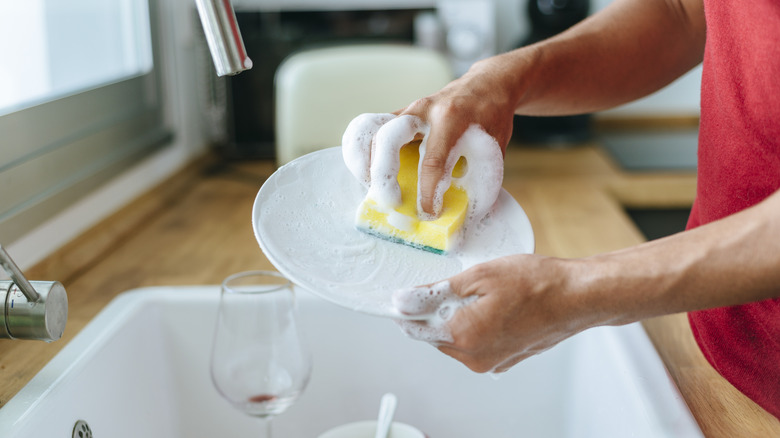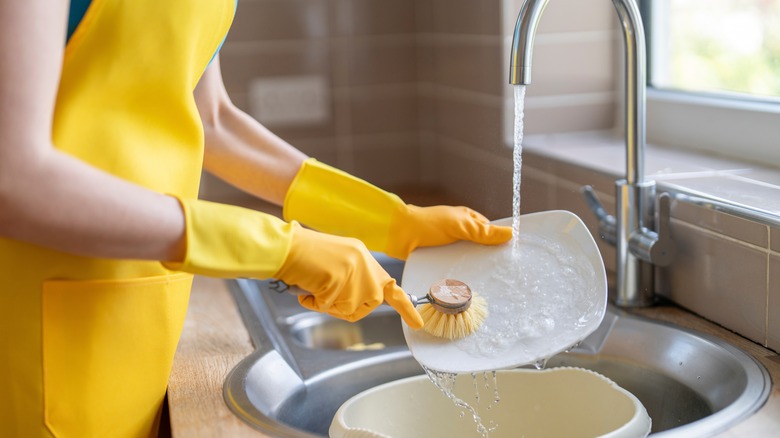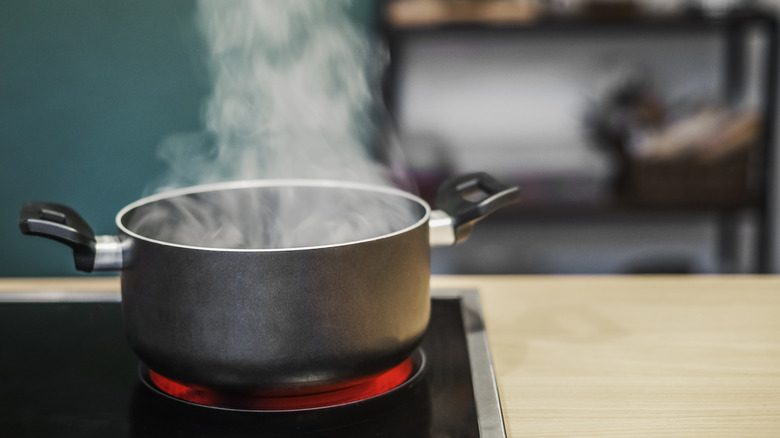The British Way Of Washing Dishes Might Gross Out Americans
It never ceases to amaze me how we humans find a way to argue over the most trivial matters. A TikTok clip recently sparked a divide over something pretty basic: how people wash their dishes. In the video, a British creator casually showed themselves scrubbing dishes in soapy water, then setting them aside to dry without rinsing. That part had Americans fully losing it. Comments rolled in about soap residue, germs, and how "unsanitary" the whole process seemed. But for a lot of Brits, this isn't weird at all.
Even though it might sound strange to an American ear, washing dishes this way actually has precedence. There were plenty of households, especially some of the older ones, where hot water wasn't readily available from the faucet — you had to heat it up yourself. Using a sink full of sudsy bubbles was more practical, as rinsing dishes under running water felt wasteful. Even when they got hot water on tap, the habit was set.
It's not about being careless; it's just a different approach. The Reddit community, British problems, wasn't having it. They defended the method, arguing it saved water while still getting the job done. This conversation might sound silly, but it's a good reminder that kitchen habits vary. What feels wrong in one culture might be completely normal in another.
My main concern would be that my food tastes like soap because of the residue, but that's just me. I guess it's one of those things I'd have to experience myself to believe that it just drips away in its entirety like water would.
Is it sanitary to skip the rinse?
According to experts, skipping the rinse might not be as horrifying as it seems, though it's not exactly ideal. The New York Times chimed in last year, pointing out that leftover dish soap on clean plates isn't likely to hurt you in small amounts since modern soaps are non-toxic and designed to break down easily. However, in the minds of many, there are good reasons why you might want to consider rinsing it anyway.
I'm not fully convinced that doing it this way doesn't yield residue. It seems like the dish full of soapy water would still have stuff like grease or food particles left on the plate even after it's cleaned since you're not rinsing them away. A quick rinse helps make sure everything is clean and clear, especially when dealing with cookware that had raw meat or sticky sauces.
Water conservation is part of the debate, of course. Some argue that filling a basin with soapy water then scrubbing and drying without rinsing uses less water overall. That may be true, but only if the American method is done sloppily. If you're using a steady stream of running water to rinse every dish, you're probably going through more water than you think.
I think you could get away with washing dishes the British way if you were washing brand new dishes since there's no food residue or anything to worry about, but to each his own. At the end of the day, it's less about being right and more about what's considered clean where you live.
It all comes down to habit and hot water
In the U.K., older homes didn't always have hot water on demand. Heating water meant boiling a kettle or using a small tank, so rinsing dishes after scrubbing wasn't a given. You'd make a sink of hot, soapy water, clean everything in one go, and leave it to dry. It wasn't about being lazy or dirty; it was just practical.
Once hot water became more available, that method didn't go away. Many people stuck to what they knew. It's probably a great way to make Thanksgiving cleanup suck less if you get to skip a step with piles and piles of dishes, but this method isn't for me, personally.
This isn't exclusive to the U.K., either. Other cultures around the world all have a particular method they use to wash dishes. It may be shaped by how much space they have, the type of cleaning supplies they use, or their access to water. What surprises people is how something as routine as dishwashing can still feel so foreign depending on where you're from.
Now that everything gets shared online, it's easier than ever to get a peek at how other people live — and judge it, apparently. But that doesn't mean one way is right and the other is wrong. If the dishes are clean and no one's getting sick, it's probably fine. Just don't expect everyone to agree on what "clean" really means. We could all do dishes like Salt Bae and just throw them in the dishwasher where we don't have to worry about any of this.


